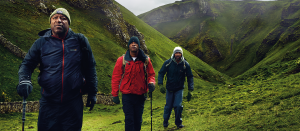
Black Men Walking by Eclipse Theatre Company
Black Men Walking is an Eclipse Theatre Company production directed by Dawn Walton and written by composer, rapper and writer Testament. It is an original, exciting and enlightening piece of theatre, which aims to resurface 500 years of forgotten Black-British history while uncovering the ever-present racism of contemporary Britain.
They walk. This month, it is only Thomas (Ben Onwukwe), Matthew (Patrick Regis) and Richard (Tonderai Munyevu). The others were probably scared of the terrible weather and have not showed up. But Thomas, Matthew and Richard all have a reason to be there. Matthew, a doctor based in Barnsley, wants to forget about his tempestuous marriage and focus on himself, for a change. Ghanaian computer programmer Richard missed the last walk due to a Star Trek convention, but he certainly would not want to miss any more chances to get away from the business of every-day life. Sheffield-based Thomas is tired, unhappy and, more than ever, obsessed with the past. They all walk to find themselves, remember themselves together. But today, Thomas is adamant: today, they walk their land to find their ancestors. It is a day of breakthrough, and they will go where no one has ever gone before. They will listen to the land cry out, finally, that they belong there. “If you listen closely, you can hear it,” Thomas explains to his puzzled companions.
On their walk, which becomes increasingly dangerous due to the adverse weather conditions, they meet Ayeesha, a 19-year-old black rapper masterfully played by Dorcas Sebuyange. She has found refuge in the countryside after being involved in a racist incident inside a fast-food restaurant. She is a wonderfully believable, courageous character and her story provides a necessary contrast to the stories of the three male walkers or, as she terms them, “posh boy, Trekkie, and old man weirdo”. The four embark on an adventure together in the middle of the now fully unwelcoming moors, the group torn between the desire to go home and that of staying and pushing through because, as Thomas points out, “How long do we have to be here to be English?”
Poetic monologues intertwine with raw, punching moments of dialogue and storytelling; this itself succeeds in evoking the unpredictability of the English countryside. The cast perfectly portrays the characters’ sense of increasing unease: this is certainly provoked by the rising mist and cold, but also stirred by Ayeesha’s young, pragmatic voice in raising the question of whether “walking the land of the ancestors” might instead be a way to run away from the responsibility of actually acting upon the problem of racism in Britain. In the end, Ayeesha proves fundamental for the men’s survival in the wilderness.
The show alternates moments of realism with moments of lyricism with ease and elegance, aided by a soundscape composed of chants and litanies that evoke forgotten histories buried in the landscape. Simon Kenny’s design enhances, with its simplicity, the sheer brilliance of the production and its cast. This is a play that invites you to reflect about the centuries of denial and oppression that have contributed to fragmenting people’s perception of history. It is a play that, with endless inventiveness, manages to paint a realistic and painful picture of the blindness and ignorance of racist Britain. It is also, though, a play that celebrates Black-British identity, friendship (even across generations) and walking, while singing an ode to the gorgeous landscape that was, has been and is – always – a silent witness to history.
Black Men Walking is playing at York Theatre Royal Studio until Saturday 14 September, tickets available here.



